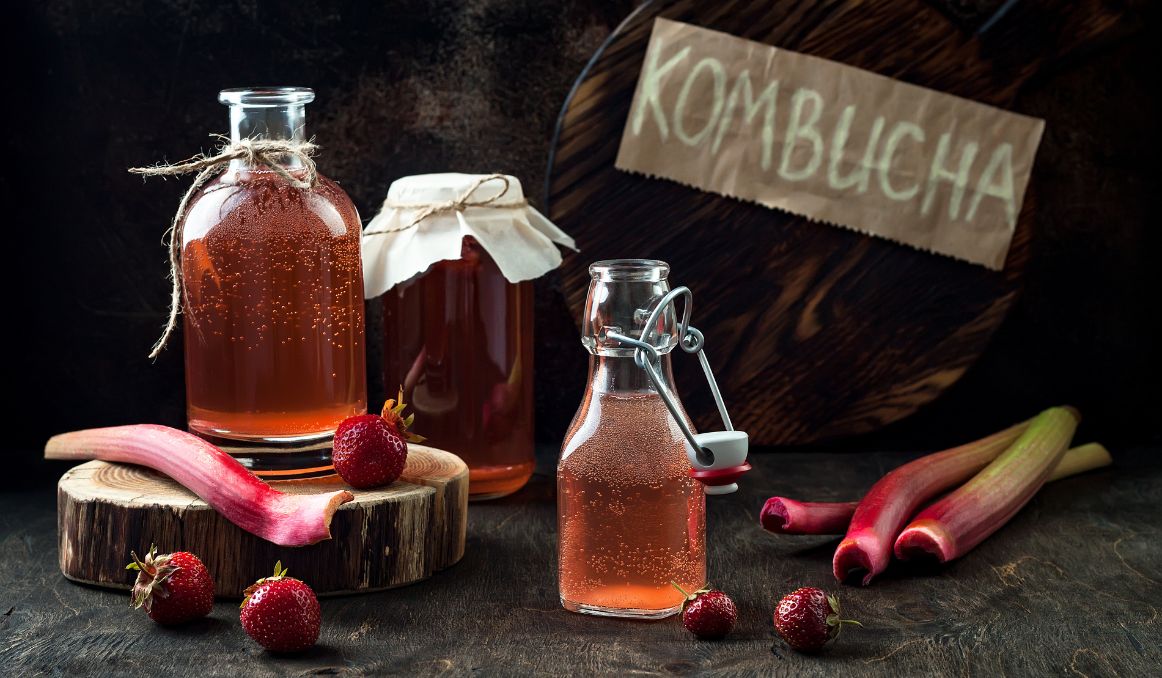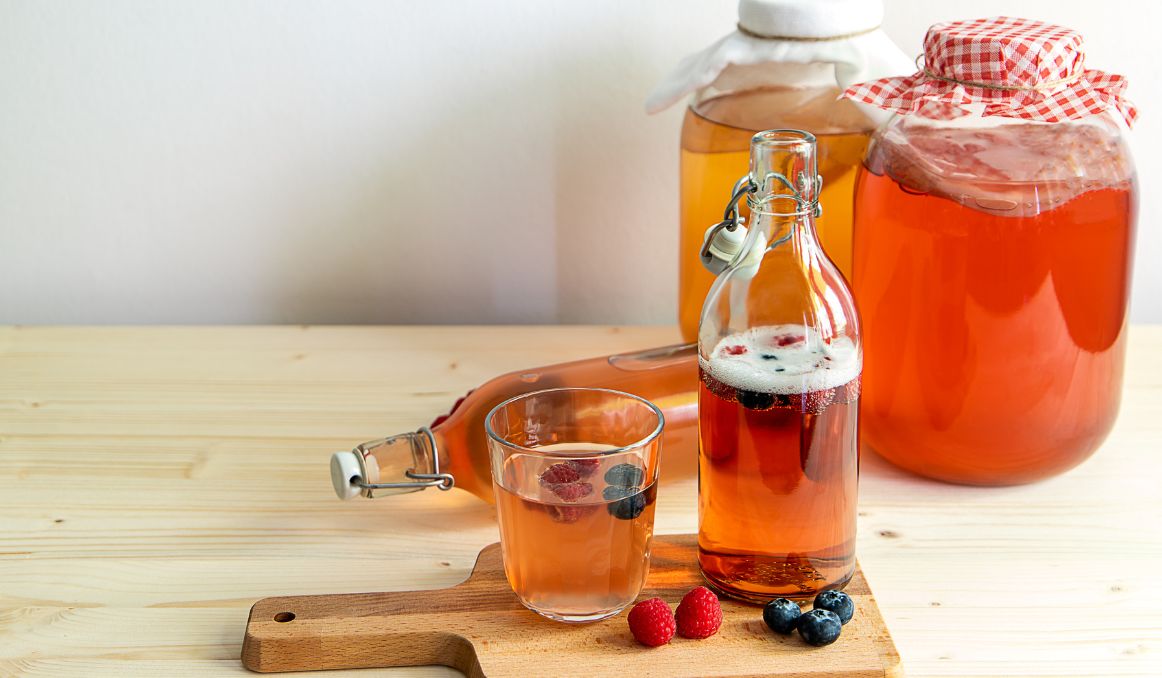What Other Fermented Drinks Like Kombucha Are There?
If you’ve heard about kombucha or tried kombucha and found that it’s not to your liking, you may be wondering what other fermented drinks like kombucha are there?
And for good reason.
Fermented beverages are beneficial for a number of reasons, so whether you want to explore your options or learn how to make your own, you’re in good shape. They are easier than ever to find on market shelves these days, and many are quite easy to experiment with at home or in your own brewery for consumers.
Kombucha

In the western world, it all really started with kombucha.
Kombucha is a fermented tea that dates back thousands of years in Asia, most likely in China, the birthplace of tea, so go figure, right?
The drink remained popular in the east as a drink good for gut health since its founding and gradually made its way into Europe during the early 1900s, but it only really made its way to the western world in the 1990s.
Of course, the freedom and liberations movements that spread through the west in the 1960s saw many people responding to study out of Switzerland that claimed kombucha had similar health benefits to yogurt. People began making kombucha at home, passing around their SCOBYs and sharing recipes.
But it was really George Thomas Dave, a man who started marketing his own kombucha to local stores in Southern California, that sparked the beginning of the kombucha craze in the US. GT’s Living Foods is now the largest purveyor of kombucha in the US, set to break $1 billion by next year.
Kombucha is a simple drink to make with a special ingredient called a SCOBY, which stands for symbiotic culture of bacteria and yeast.
Once you have a SCOBY, and yes, you can make your own following a number of recipes online, you can use it to ferment a combination of black tea, green tea, and any juice of your choice.
What Is a Fermented Drink?
In general, a fermented drink is any beverage that has been created using either yeast or bacteria or both.
Fermented foods and beverages go back to virtually the beginning of human existence as fermentation allows us to preserve our foods through long winters and use foods that would otherwise go bad.
To ferment any beverage, you can simply ensure it has fermentable carbohydrates – sugars, starches, or fibers – and that you either add yeast or bacteria, or a SCOBY, or leave it exposed to the elements so that local wild yeast and bacteria can enter the beverage and ferment it for you.
After about a week left in a warm, moist environment, the beverage will be fermented.
You can watch the fermentation process take place as it begins frothing, fizzing, and bubbling to a riotous peak and then dies down.
Once that peak has died down, you will likely see flocculated yeast or bacteria settled on the surface of your beverage. You can skim that off, strain out any sediment, and enjoy.
What Are the Benefits of a Fermented Drink?
Fortunately, the benefits of fermented beverages go far beyond simply preserving foods.
The health benefits of fermented beverages are numerous as both yeast and bacteria provide numerous nutrients to the foods they ferment.
In today’s functional medicine environment, we refer to fermented drinks as functional foods.
The number one health advantage to a fermented drink is its probiotic qualities.
Probiotics can be thought of as the good bacteria your gut needs to fight off bad bacteria and viruses.
In general, people with healthier gut bacteria tend to get sick less often, recover from illness more quickly, live longer, and are less likely to get cancer and other chronic conditions, including brain diseases.
Furthermore, most fermented drinks are also rich in nutrients like polyphenols, vitamins, minerals, antioxidants, and more.
Fermented Beverages List
In general, most fermented beverages are going to have at least trace amounts of alcohol because they involve fermentable carbohydrates like sugars or starches and yeast, the two critical ingredients for the production of alcohol. You can find fermented beverages quite low in alcohol, as most are, and of course you can find “harder” versions with intentionally elevated levels of alcohol.

Alcoholic
Alcoholic fermented beverages include:
- Wine
- Beer
- Mead
- Barley Wine
- Sake
- Hard kombucha
Non-Alcoholic
Non-alcoholic beverages include:
- Kombucha
- Kvass
- Tepache
- Kefir
- Shrub
How to Make Your Own Fermented Beverage
To make your own fermented drink, you can choose your primary ingredient as a base. For kombucha you will choose green or black tea or both, and then add any other ingredients you like.
There are juices that can be fermented, like tepache, which is an ancient Aztec beverage that calls for all parts of a pineapple cut up with a bit of brown sugar added. Cover them all in a container, add some water to cover the ingredients, and let sit for about week.
This recipe is common to pretty much all fermented drinks and can be employed for the wide range of sugary or starchy drinks.
Just be mindful to watch for mold growth and any off smells.
It is not usual, as yeast and bacteria will typically kill it off, but in the even that you do see active mold growing, simply toss that batch and try again. It is a good idea also to prepare two batches in separate containers just in case of an unlikely mold invasion.
Once your drink has fermented, it will keep just fine for a few weeks in the refrigerator in a sealed container.
Because of the yeast, your beverage will have low levels of alcohol, so depending on your preference, just remember that the more sugar you have in your drink (think grapes), the higher the alcohol content will be as it is the sugars that convert to alcohol.
Cheers!
Passionate about the fermentation process? So are we! If you’re interested in finding out how you can use our technology to control fermentation and monitor your yeast, save work hours and improve the cost-efficiency of your business, drop us a line at [email protected] or check out our product pages:
- Oculyze BB 2.0 (Better Brewing) Yeast Cell Counter App + Hardware
- Oculyze FW (Fermentation Wine) Yeast Cell Counter App + Hardware
Also, you can now get access to a fully functional demo account to test our Web App. Completely free of charge and with no commitment to purchase.
Sources:


